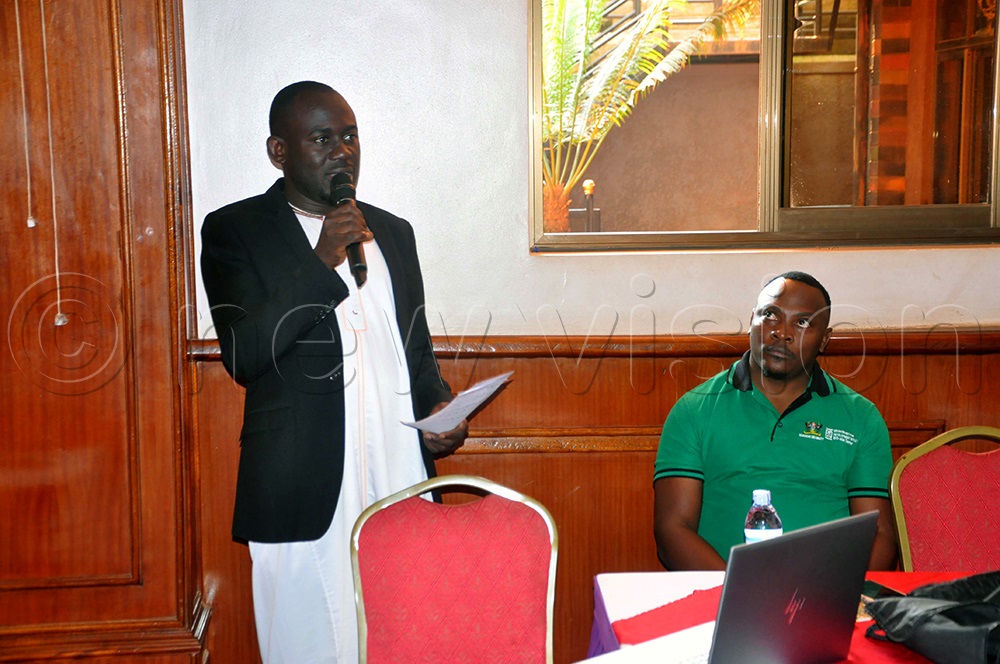Urban poor face worsening diet quality amid crises, study shows
Kasalirwe emphasised that health crises, environmental shocks and economic downturns have negatively affected food security and livelihoods, particularly for urban dwellers who rely on markets for food.
Fred Kasalirwe (Right), a lecturer at Makerere University presenting the findings of the study at Tick Hotel in Kawempe Division, Kampala. (Photo by John Odyek)
__________________
Experts are urging the development of stronger mechanisms to protect the poor and vulnerable from economic, health and climate shocks, which continue to worsen food insecurity and undermine balanced diets.
Findings from a study conducted in Kawempe Division, Kampala, revealed that such shocks have significantly exacerbated food insecurity among the urban poor. The study’s results were unveiled on July 31, 2025, at Tick Hotel in Kawempe Division.
Fred Kasalirwe, a lecturer at the School of Economics, Makerere University, and one of the researchers, explained that the study, partly carried out in 2022, focused on assessing the impact of COVID-19 on the urban poor. The survey involved 415 households in Kawempe, one of the areas with the highest concentration of urban poor in Uganda. The study is titled Gender Differences in Economic Shocks' Effects on Food Security and Adaptive Strategies Among the Urban Poor in Uganda.
Kasalirwe emphasised that health crises, environmental shocks and economic downturns have negatively affected food security and livelihoods, particularly for urban dwellers who rely on markets for food. “Low incomes, particularly within the informal sector, increase vulnerability to food insecurity. Moreover, Uganda’s social protection systems remain weak and narrowly focused,” he said.
He cited several recent contributors to food insecurity, including the COVID-19 pandemic, economic recessions, prolonged droughts, floods, mudslides, civil wars, political instability and major reductions in aid, such as the suspension of USAID programmes. These shocks have disrupted food supply chains, reduced incomes, displaced populations and hampered economic activity.
The COVID-19 outbreak in March 2020 prompted strict containment measures, including lockdowns, curfews, school closures and the suspension of public transport. These measures severely impacted livelihoods, leading to job losses, business closures and restricted access to essential goods and services. The urban poor working in informal sectors were hardest hit due to their low incomes, limited savings and lack of adequate social protection.
Dr. Peter Babyenda, lecturer at the School of Economics, Makerere University, addressing participants during the release of the study at Tick Hotel in Kawempe Division, Kampala. (Photo by John Odyek)
The study assessed the short- and medium-term food security risks and livelihood challenges caused by COVID-19, analysing gender differences and coping mechanisms to inform policy support for vulnerable urban populations.
Its findings showed a decline in food security and diet quality for both male- and female-headed households, largely due to reduced incomes and limited income-generating activities. Female-headed households were disproportionately affected. In contrast, persons with disabilities reported improved food security, likely because of targeted social support.
Kasalirwe noted that households were forced to adopt drastic coping strategies, including involuntary dietary changes, selling household assets to buy food and depleting savings and business capital.
He stressed that the key lessons learned were that income reductions during crises are major triggers of food shortages and that female-headed households are especially vulnerable. “Current social protection is weak and limited, while common coping strategies often deepen poverty. Strengthening social protection for the poor is urgent. Although government aid during crises is limited, promoting savings schemes for low-income earners and the urban poor offers hope for restoring livelihoods,” Kasalirwe said.
Other research team members include Prof. Fred Matovu, Associate Professor of Economics at Makerere University, and Anitah Kyamugabwa from the Environment for Development-Makerere Centre (EfD-Mak).
Dr Peter Babyenda, lecturer at the School of Economics, Makerere University, who represented Prof. Edward Bbaale, director of EfD-Mak and Principal of the College of Business and Management Sciences at Makerere University, observed that the urban poor suffered most during lockdowns due to restricted movement. However, he added that lockdowns also spurred innovation, with some individuals producing items such as face masks from home.
“The government must always plan with the poor in mind so that protection mechanisms are in place before shocks occur,” Babyenda said. He pointed out that some members of savings and credit associations were less affected, thanks to their savings culture.
Community development officer Jacqueline Akello from Kampala Capital City Authority emphasised that, since many urban households depend heavily on markets for food, embracing home-based food production, such as growing vegetables, can sustainably enhance food security.
Akello called for the re-establishment and strengthening of community and national food reserves to buffer against future shocks. She urged the government to prioritise investment in resilient food systems rather than relying mainly on crisis-driven donations.
She warned of the broader social consequences of food insecurity, including its role in fuelling gender-based violence, child marriages and family separations. Akello underscored that food security is not only an economic issue but also a social imperative critical to protecting vulnerable populations.